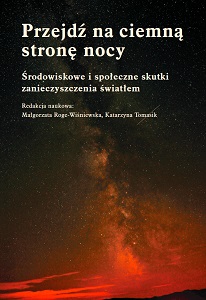FUNKCJONOWANIE ZEGARA BIOLOGICZNEGO CZŁOWIEKA W WARUNKACH SKAŻENIA ŚWIATŁEM
LIGHT POLLUTION AS A FACTOR DISTURBING HUMAN BIOLOGICAL CLOCK
Author(s): Krystyna Skwarło-Sońta
Subject(s): Regional Geography, Conference Report
Published by: Wydawnictwa Uniwersytetu Warszawskiego
Keywords: biological clock; circadian rhythms; pineal gland; melatonin; light pollution
Summary/Abstract: Life on Earth is related to its rotations, introducing the diurnal and seasonal changes experienced by all living organisms. Among the environmental signals, the photoperiod is one of the most important cues responsible for the timing of the diurnal and seasonal rhythms and ensuring their synchronization to the annual geophysical cycles. The circadian system, entrained to the day-night cycle, allows organisms to anticipate and adapt to the 24-hr daily cycles of the environment, ensuring that behavioral and physiological responses occur during right temporal niche. On the other hand, the pineal gland, a neuroendocrine organ existing in all vertebrates, is a structure responsible for translating these environmental information into a chemical message understood by the cells and tissues within the body. This message consists of the pineal hormone melatonin, synthesized and released from the pineal gland in the rhythmical fashion. Light is a factor inhibiting activity of the pineal gland while during the nocturnal darkness melatonin is synthesized and released to the blood. Melatonin consists of a message of darkness and therefore it acts for an organism as „a clock and calendar”. In the modern society, having enormous benefits from the omnipresent electricity, the darkness at night is vanishing because of the light pollution steadily increasingly. Facility of the transmeridian traveling, shift-work and activity 24/7/365, as well as using numerous instruments emitting different wavelength light enormously improves our life but, on the other hand, all these factors can alter human physiology, and in particular its circadian organization. Desynchronization of the internal rhythms from each other and decoupling them from the local environment could be one of the mechanisms underlying the adverse effect of light pollution on the wild life ecology and human physiology contributing to the etiology and affects the risk of several human disorders.
Book: Przejdź na ciemną stronę nocy. Środowiskowe i społeczne skutki zanieczyszczenia światłem
- Page Range: 129-144
- Page Count: 16
- Publication Year: 2015
- Language: Polish
- Content File-PDF

